Tag Archives for " realistic acrylic portrait "
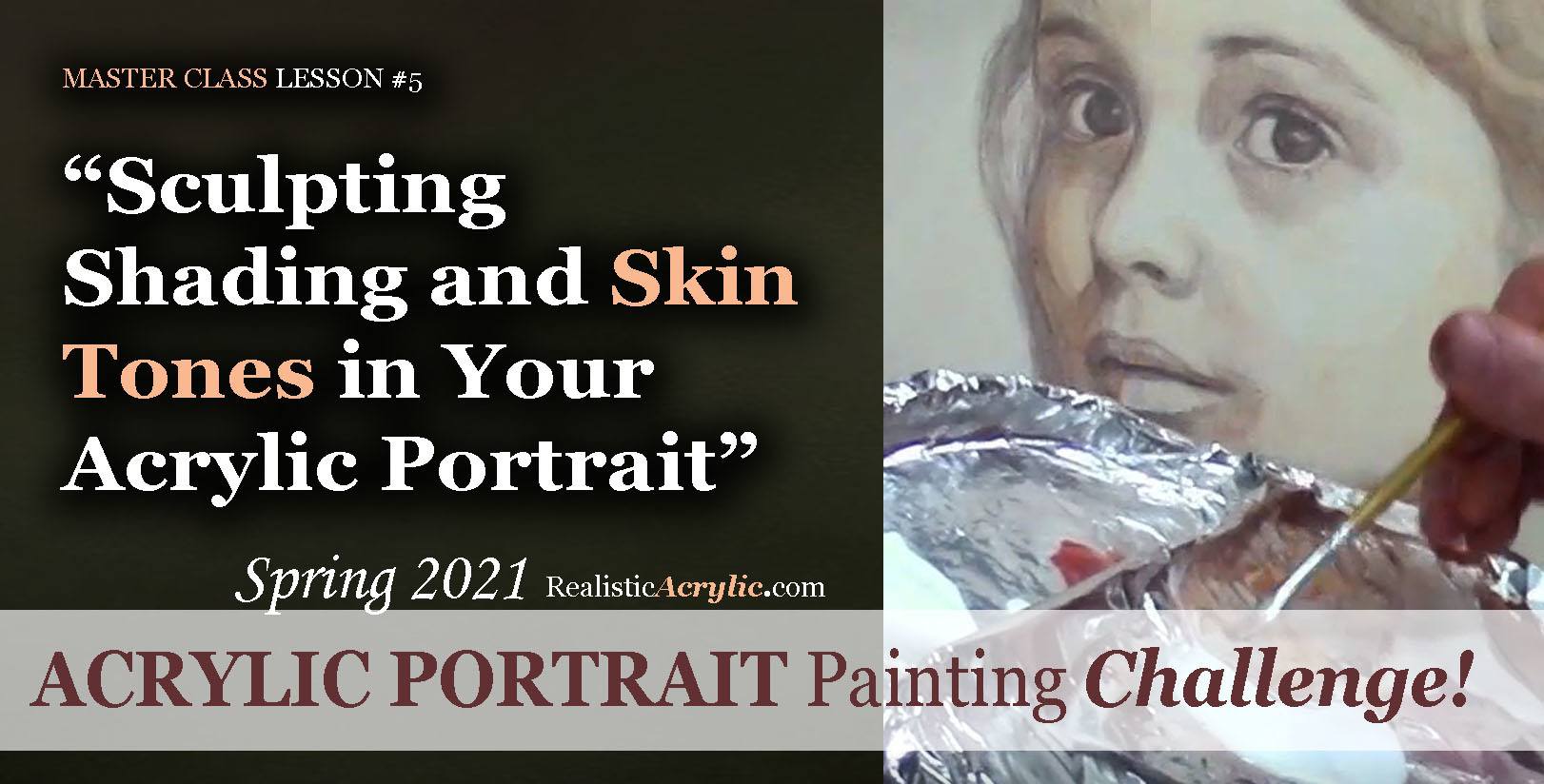
Spring 2021 Acrylic Portrait Painting Challenge: Sculpting Shading and Skin Tones in Your Acrylic Portrait
Acrylic portrait painting, in many ways, is like creating a sculpture. We want to truly make our faces look realistic and three-dimensional. In this master class video lesson, I show you how to do exactly that.
We’re breaking a fine art portrait painting down into bite-size steps that YOU can do.
Specifically, in this video lesson, I demonstrate how darkening your background can really make the face stand out in a lifelike way.
What colors should we use for the shadows? I’ll show you how to mix them, what brushes to use to apply them, and HOW to do it. Get the shadows right, and 80% of the battle is won, so to speak in your portrait.
What colors for the skin tones?
In this video, you’ll learn the correct color to mix, how to create glazes with matte medium and apply it to the face smoothly.
This is still very much the beginning. More lessons to come.
Take the Acrylic Portrait Painting Challenge (it’s FREE!) and paint along with us!
REGISTER TODAY. The challenge is ongoing, something you can do at your own pace. It’s not too late to enter! After you join, I’ll send you the supplies list and reference photos to paint from.
Register for the Challenge!
WATCH NOW…
Lesson #5: Sculpting Shading and Skin Tones in Your Acrylic Portrait
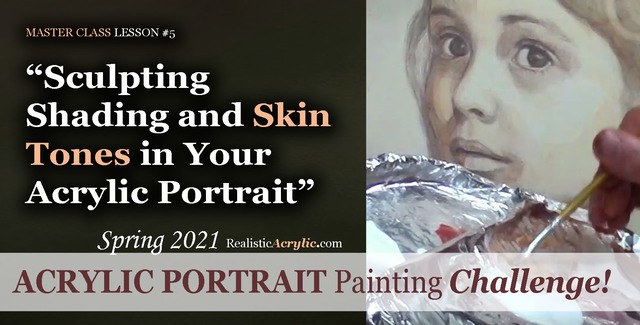
Acrylic Portrait Painting Challenge Lesson #5: Sculpting Shading and Skin Tones in Your Acrylic Portrait
Would like to paint this portrait with me and hundreds of other artists?
Take the 2021 Spring Portrait Painting Challenge!
You can register below and get started. It is completely FREE to join the challenge and participate. When you join, I’ll send you the “Welcome Kit” which includes:
- The Supplies List (so you know what you need to paint with us, your shopping list. 🙂 )
- The Reference Photo with and without the grid, high resolution, that you can download ready to print out or display on your tablet. You’ll be able to create an accurate portrait this way.
- The Palette Layout Guide showing you how to arrange your colors so they don’t get muddy on your palette
- The Master Class Lesson Schedule
- the Lessons emailed to you
- A private Facebook group to cheer you and help answer your questions
- And a few “bonuses” like opportunities to win my paid online classes
REGISTER TODAY. The challenge is ongoing, something you can do at your own pace. It’s not too late to enter!
Register for the Challenge!What’s coming up in the next lesson? More shading, more skin tones, and the start of some detail work. Follow the lessons and you will be able to create a portrait you can be proud of…even if you’re a complete beginner!
Let me know if you have any questions and I look forward to teaching you more!
—Matt
Questions? Suggestions? Thoughts? Let me know, below in the comments. Please share your sketches in our Facebook group and share this post with your friends!
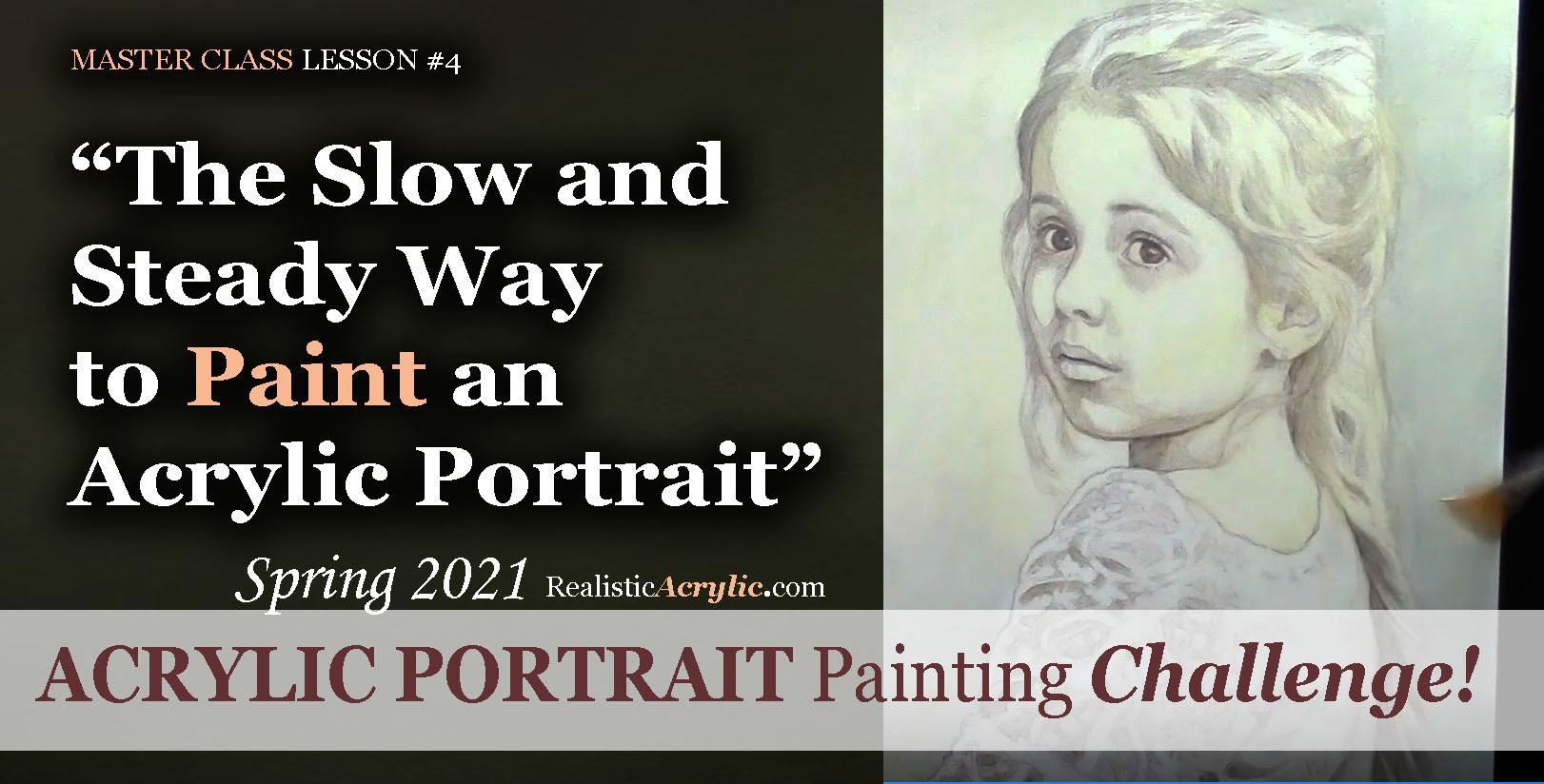
Spring 2021 Acrylic Portrait Painting Challenge: The Slow and Steady Way to Paint an Acrylic Portrait
If you remember the childhood story, “The Tortoise and the Hare,” you recall that the hare started out really fast and put the tortoise to shame. But then the rabbit took a nap, while the slow, while the turtle, with his slow methodical steps, passed him up and won the race!

Sometimes slow is better for painting an acrylic portrait.
Likewise, in an acrylic portrait, we often want to see quick results. But if we take our time, and just add one layer on top of another, even though it looks like hardly anything is happening, eventually, we will end up with a great painting!
I’d like to show you how to slow down a bit, take your time, and paint your acrylic portrait layer by layer, using the acrylic glazing technique.
Take the Acrylic Portrait Painting Challenge (it’s FREE!) and paint along with us!
REGISTER TODAY. The challenge is ongoing, something you can do at your own pace. It’s not too late to enter! After you join, I’ll send you the supplies list and reference photos to paint from.
Register for the Challenge!
WATCH NOW…
Lesson #4: The Slow and Steady Way to Paint an Acrylic Portrait
In this master class lesson #4, I demonstrate how to continue darkening your darkest values on the face and background, and then work in some warmer glazes to set up the skin tones on her face. We’re going very light, using a large amount of matte medium (95%) to a small amount of paint (5%)
Watch how to do it here…
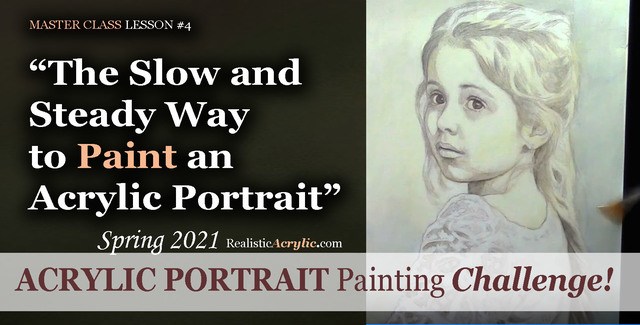
Learn how to paint an acrylic portrait slowly and correctly, step-by-step in this FREE master class lesson by Matt Philleo at Realistic Acrylic Portrait School!
Would like to paint this portrait with me and hundreds of other artists?
Take the 2021 Spring Portrait Painting Challenge!
You can register below and get started. It is completely FREE to join the challenge and participate. When you join, I’ll send you the “Welcome Kit” which includes:
- The Supplies List (so you know what you need to paint with us, your shopping list. 🙂 )
- The Reference Photo with and without the grid, high resolution, that you can download ready to print out or display on your tablet. You’ll be able to create an accurate portrait this way.
- The Palette Layout Guide showing you how to arrange your colors so they don’t get muddy on your palette
- The Master Class Lesson Schedule
- the Lessons emailed to you
- A private Facebook group to cheer you and help answer your questions
- And a few “bonuses” like opportunities to win my paid online classes
REGISTER TODAY. The challenge is ongoing, something you can do at your own pace. It’s not too late to enter!
Register for the Challenge!Let me know if you have any questions and I look forward to teaching you more!
—Matt
Questions? Suggestions? Thoughts? Let me know, below in the comments. Please share your sketches in our Facebook group and share this post with your friends!
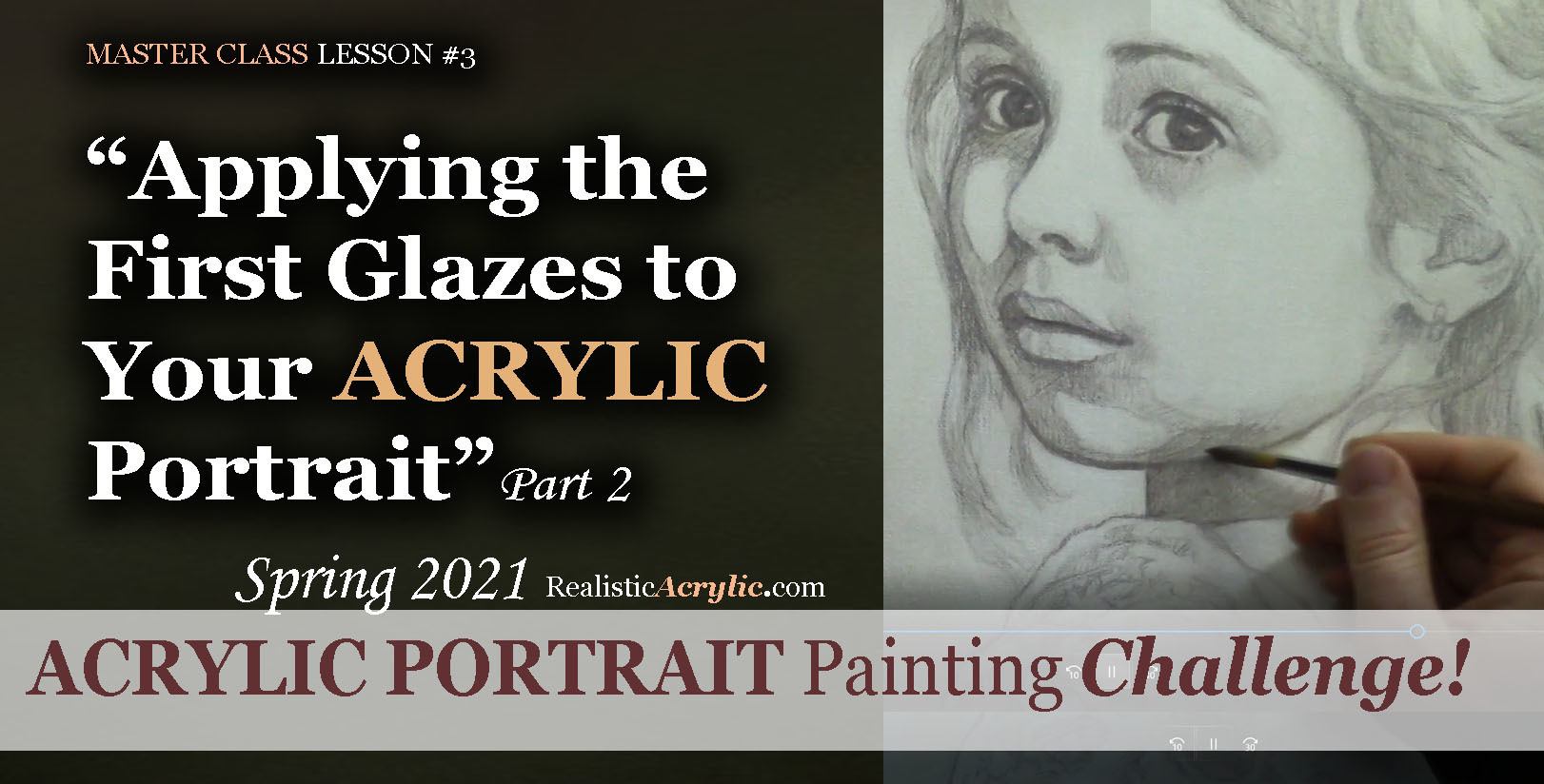
Spring 2021 Acrylic Portrait Painting Challenge: Applying Your First Glazes
Think of the acrylic glazing technique as a Polaroid camera print.
Remember those? You would load up the small film sheets, snap a picture and out popped the print. Back in those days (yes, I’m old enough to remember them) this was amazing. You wouldn’t have to drop off your film and wait 3 days (or even an hour!) for it to process.
But even then, it wasn’t immediate. The image would slowly fade in, and you’d watch a vague outline of your scene start to materialize. Finally, after a minute, you’d have a beautiful print!
In the same way, instead of painting our portrait one section at a time, with thick, opaque applications of paint, we slowly fade it in, covering the entire canvas at once, in stages. We use the classical acrylic glazing technique, just like Da Vinci, Titian and Vermeer used during the Renaissance to achieve smooth, subtle nuances of color and value, vibrant colors, and incredible depth.
I’ll show you how to do it!
But first, make sure you’re registered for the challenge!
REGISTER TODAY. The challenge is ongoing, something you can do at your own pace. It’s not too late to enter! After you join, I’ll send you the supplies list and reference photos to paint from.
Register for the Challenge!
WATCH NOW…
Applying the First Glazes to Your Acrylic Portrait, Part 1
Before we can begin the painting, first we must seal in the sketch, so it doesn’t smear or muddy up our paint. Next, we need to white-out the grid lines so they don’t distract from our final painting presentation. Lastly, we mute the sketch and tone the canvas in one step, so that we don’t have a white canvas staring us in the face, and so that the sketch is softened—easier to convert to a painting.
Watch how to do it here…
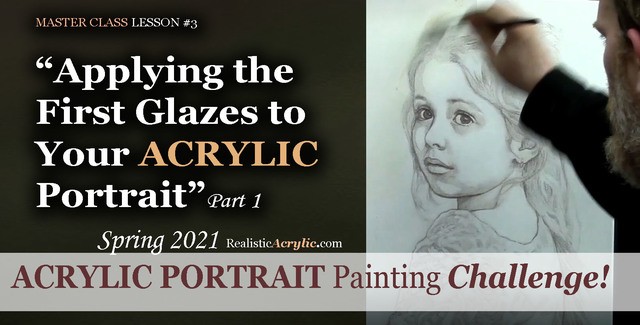
Learn to paint a realistic acrylic portrait using the classical glazing technique in this free online class. Lesson 3: Beginning the painting process–sealing in the sketch, whiting
Applying the First Glazes to Your Acrylic Portrait, Part 2
Let’s begin the actual painting process! I’ll show you what colors we are using, how to block in the value structure simply with just two colors and matte medium. We’re going to go light and leave room to correct any mistakes. This will be the foundation we’ll build off of from here on out…
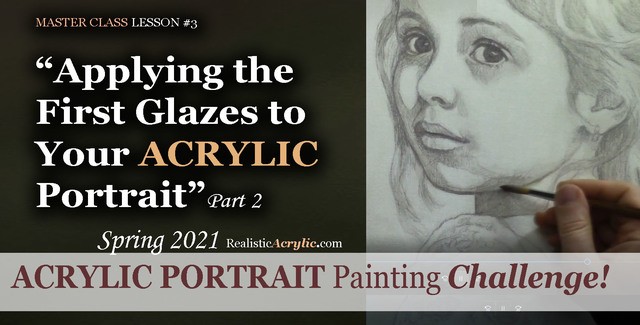
Learn to paint a realistic acrylic portrait using the classical glazing technique in this free online class. Lesson 3: Beginning the painting process
Would like to paint this portrait with me and hundreds of other artists?
Take the 2021 Spring Portrait Painting Challenge!
You can register below and get started. It is completely FREE to join the challenge and participate. When you join, I’ll send you the “Welcome Kit” which includes:
- The Supplies List (so you know what you need to paint with us, your shopping list. 🙂 )
- The Reference Photo with and without the grid, high resolution, that you can download ready to print out or display on your tablet. You’ll be able to create an accurate portrait this way.
- The Palette Layout Guide showing you how to arrange your colors so they don’t get muddy on your palette
- The Master Class Lesson Schedule
- the Lessons emailed to you
- A private Facebook group to cheer you and help answer your questions
- And a few “bonuses” like opportunities to win my paid online classes
REGISTER TODAY. The challenge is ongoing, something you can do at your own pace. It’s not too late to enter!
Register for the Challenge!Let me know if you have any questions and I look forward to teaching you more!
—Matt
Questions? Suggestions? Thoughts? Let me know, below in the comments. Please share your sketches in our Facebook group and share this post with your friends!
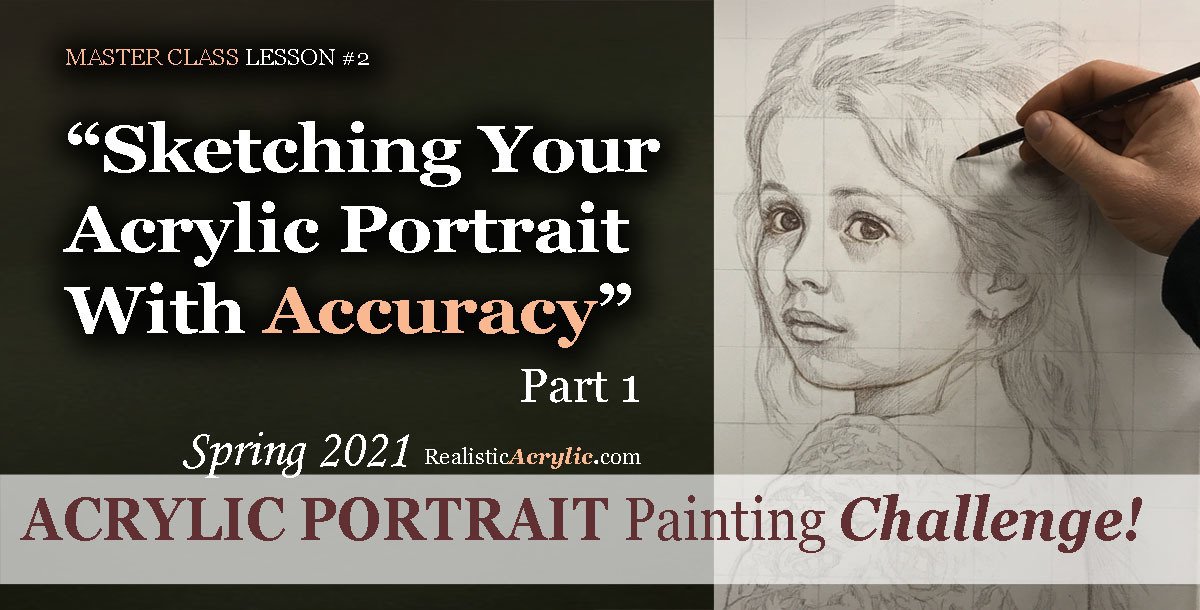
Spring 2021 Acrylic Portrait Painting Challenge: Sketching Your Portrait with Accuracy
Just like a contractor would never dream of building a home without a sure foundation, we shouldn’t try to paint an acrylic portrait without the same.
A sketch serves as an excellent foundation to build upon. I will show you in this series of Master Class Lessons how to sketch your portrait accurately.
With an accurate sketch, you are already halfway there to a beautiful painting.
I’ll show you how to do it, step-by-step, using the grid method.
With the grid method, even a beginner can create a realistic sketch. With that in place, I can help you build on top, layer by layer using the glazing technique to create smooth transitions of value and lifelike skin tones. You can do this. I’ll be here to help.
Ready? Let’s get started!
I’ll show you exactly how to do it in the lessons below. But first, make sure you’re registered for the challenge!
REGISTER TODAY. The challenge is ongoing, something you can do at your own pace. It’s not too late to enter! After you join, I’ll send you the supplies list and reference photos to paint from.
Register for the Challenge!
WATCH NOW…
Sketching Your Portrait With Accuracy, Part 1
Let’s begin the sketch! Get out your colored pencil and start making some simple marks. Look at the squares and see where the lines fall. All we need to do at this stage is loosely capture the outline of the subject—the girl—and later on, we will fill in the details. “What if I make a mistake?” No problem. That’s what erasers are for!
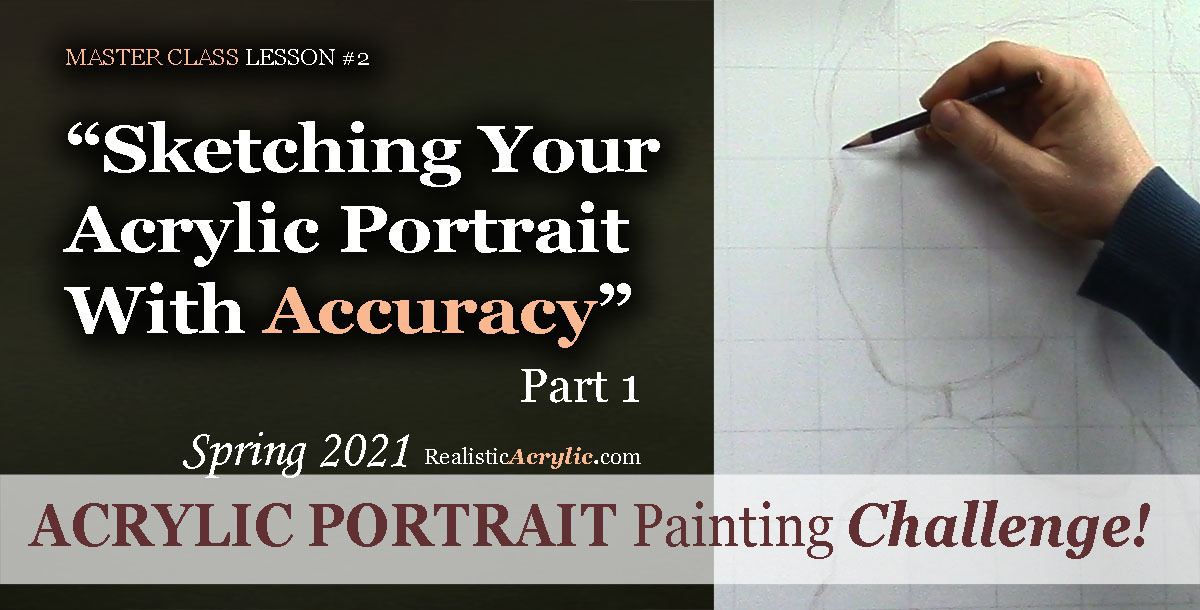
Learn how to sketch a portrait accurately with Realistic Acrylic Portrait School’s FREE Challenge Master Class Lessons!
Sketching Your Portrait With Accuracy, Part 2
Learn how to paint a realistic acrylic portrait by creating a solid sketch. In this in-depth video lesson, I’ll show you how to refine the facial features on your portrait drawing. After watching, you’ll be able to capture a better likeness and also plot out where your shadows and highlights will be.
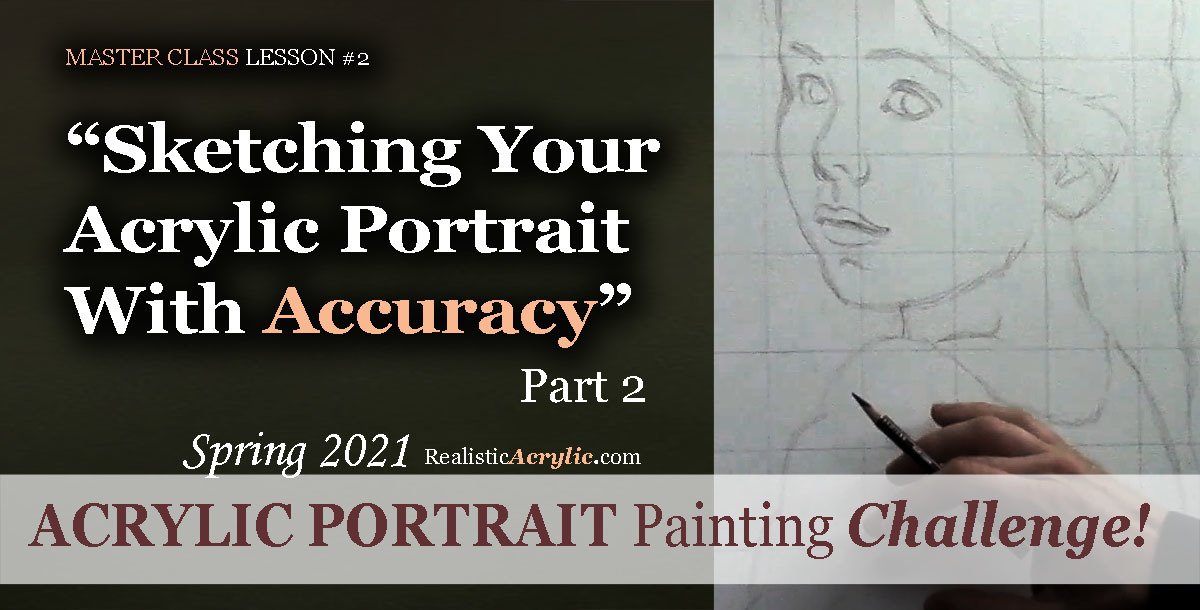
Learn how to sketch a portrait accurately with Realistic Acrylic Portrait School’s FREE Challenge Master Class Lessons!
Sketching Your Portrait With Accuracy, Part 3
We’re going further in this sketch for the Acrylic Portrait Painting Challenge! I show you how to add detail to the girl’s hair. It’s important to break down the complex shapes into something simple, and then add the complexity back in again, to make it realistic. I’ll show you how to do it.
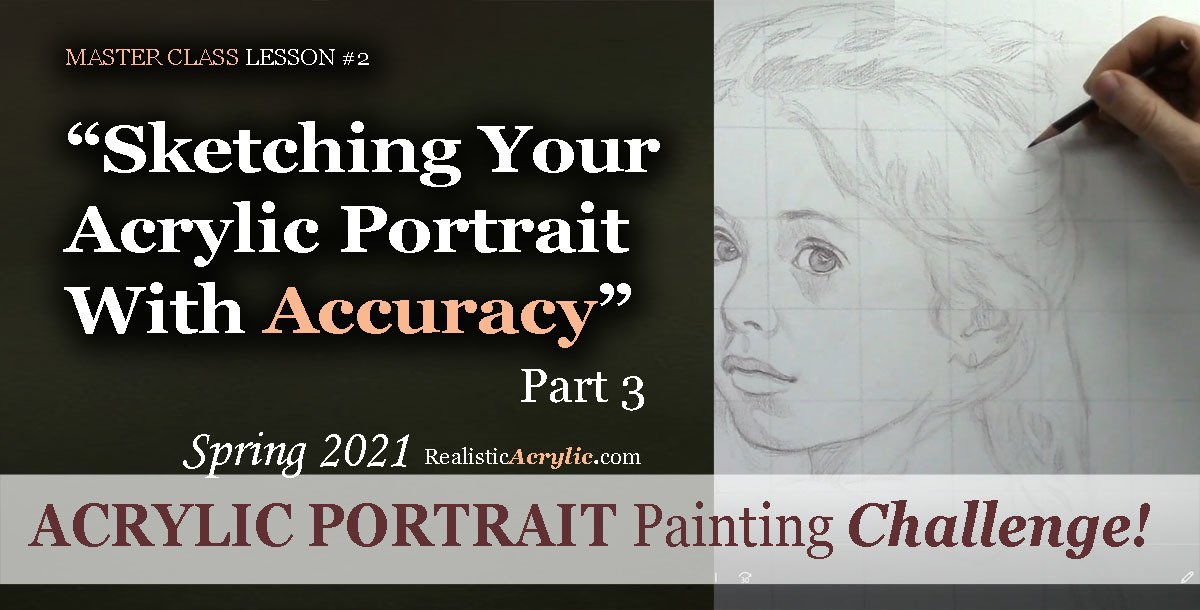
Learn how to sketch a portrait accurately with Realistic Acrylic Portrait School’s FREE Challenge Master Class Lessons!
Sketching Your Portrait With Accuracy, Part 4
In this Master Class Lesson, I will be teaching you how to sketch the lace for the girl’s dress top. It is an extremely detailed portion of the photo, but again, we will follow the method of breaking the complex into simple. That way, we don’t spend all day sketching this portrait and it will be easier to block in during the painting process.
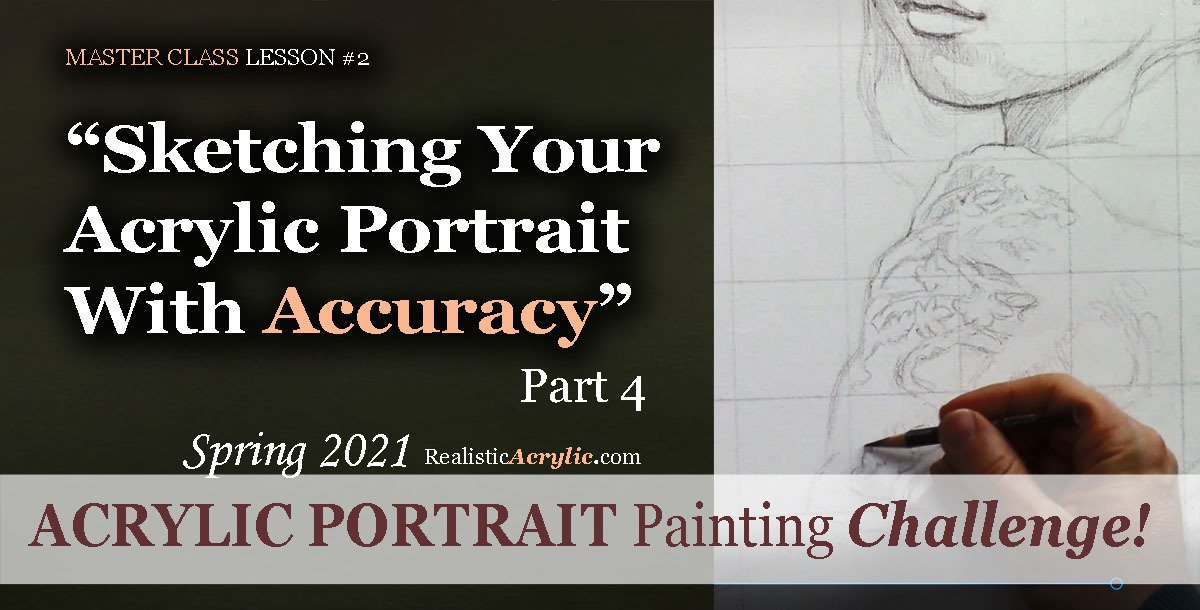
Learn to paint a realistic acrylic portrait successfully by first doing an accurate sketch, as taught by professional artist and instructor, Matt Philleo of Realistic Acrylic Portrait School
Sketching Your Portrait With Accuracy, Part 5
Let’s finish this sketch up! In this lesson, I’ll show you how to add the final touches to the lace, the girl’s face, and some additional details to make this drawing as realistic as possible. Then, we can dive into the painting process with confidence!
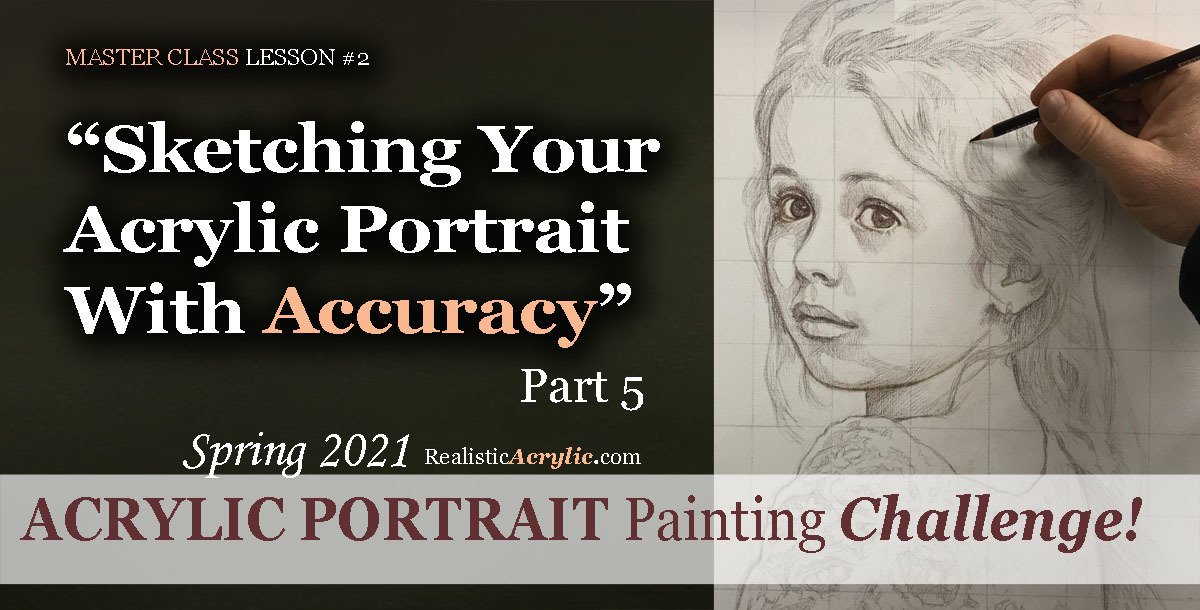
Learn to paint a realistic acrylic portrait successfully by first doing an accurate sketch, as taught by professional artist and instructor, Matt Philleo of Realistic Acrylic Portrait School
Would like to paint this portrait with me and hundreds of other artists?
Take the 2021 Spring Portrait Painting Challenge!
You can register below and get started. It is completely FREE to join the challenge and participate. When you join, I’ll send you the “Welcome Kit” which includes:
- The Supplies List (so you know what you need to paint with us, your shopping list. 🙂 )
- The Reference Photo with and without the grid, high resolution, that you can download ready to print out or display on your tablet. You’ll be able to create an accurate portrait this way.
- The Palette Layout Guide showing you how to arrange your colors so they don’t get muddy on your palette
- The Master Class Lesson Schedule
- the Lessons emailed to you
- A private Facebook group to cheer you and help answer your questions
- And a few “bonuses” like opportunities to win my paid online classes
REGISTER TODAY. The challenge is ongoing, something you can do at your own pace. It’s not too late to enter!
Register for the Challenge!Let me know if you have any questions and I look forward to teaching you more!
—Matt
Questions? Suggestions? Thoughts? Let me know, below in the comments. Please share your sketches in our Facebook group and share this post with your friends!
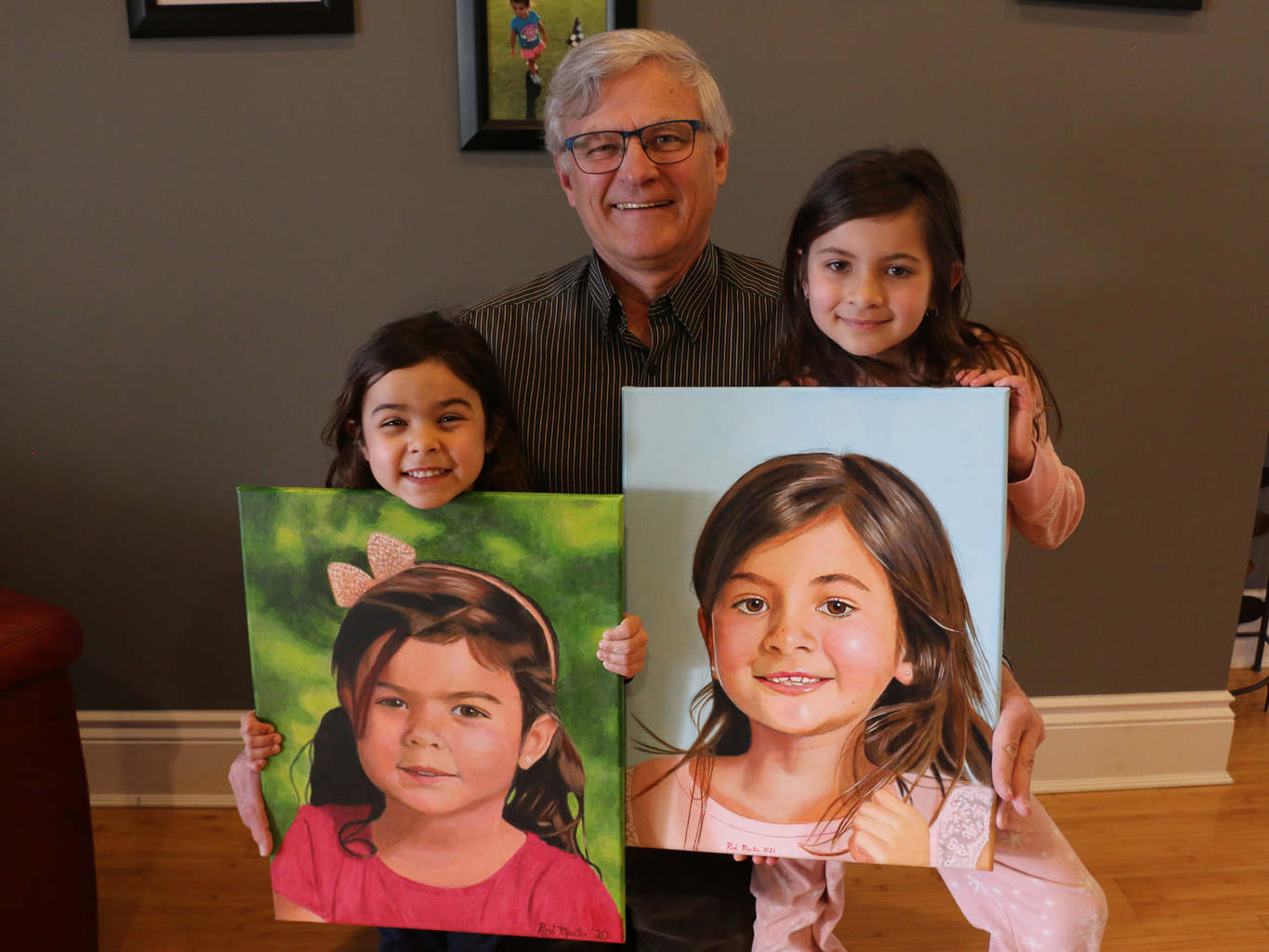
You Can Learn How to Paint a Realistic Acrylic Portrait
“Can I paint a portrait?”
This is the question so many of my students asked themselves prior to taking my master class for the Acrylic Portrait Painting Challenge.
The fact is: yes, you can.
“But,” you may ask right now as you read this, “Will it look terrible? Will it even look human? Will the skin tones be muddy? Will I be able to get a good likeness? Will the paint layers get blotchy? How exactly do I paint a portrait?”
Again, these questions have been asked before. You’re not alone.
And I’m happy to say, that many of my students, an aspiring artist just like you, have taken these questions to the canvas, started painting following my step-by-step video instruction, and created a beautiful portrait. Even as beginners.
Then now, I can’t promise you’ll be able to paint a Rembrandt your very first try.
But I will promise this: if you come with a mindset of being willing to try, and being willing to hang in there when the painting process gets challenging, you will create a portrait that is way better than you ever thought possible!
Some of my students create portraits that look professional on their very first attempt. Others create portraits that are much improved from what they previously did, but they will need to keep practicing to get better. (We all need to keep working to get better, myself included! 🙂 )
So you can do this! And then I’ll show you how, and you won’t be alone.
Last year, I launched our inaugural spring portrait painting challenge, just as the lockdowns of the coronavirus hit. And then Over 700 artists took the challenge, and I have personally seen many, many portraits that look amazing considering it was the very first portrait they ever did.
In this case, you would think they had been painting for years! When they posted their portraits to social media, they started getting commissions! Of course, others started painting portraits of family members to give as unique gifts.
Then here’s what my student Rod Martin (part of the Realistic Acrylic All-Access Membership) created. So below is his very first acrylic portrait (on the left) and a more recent one on the right. And when I write this, he’s only been with me for a year!
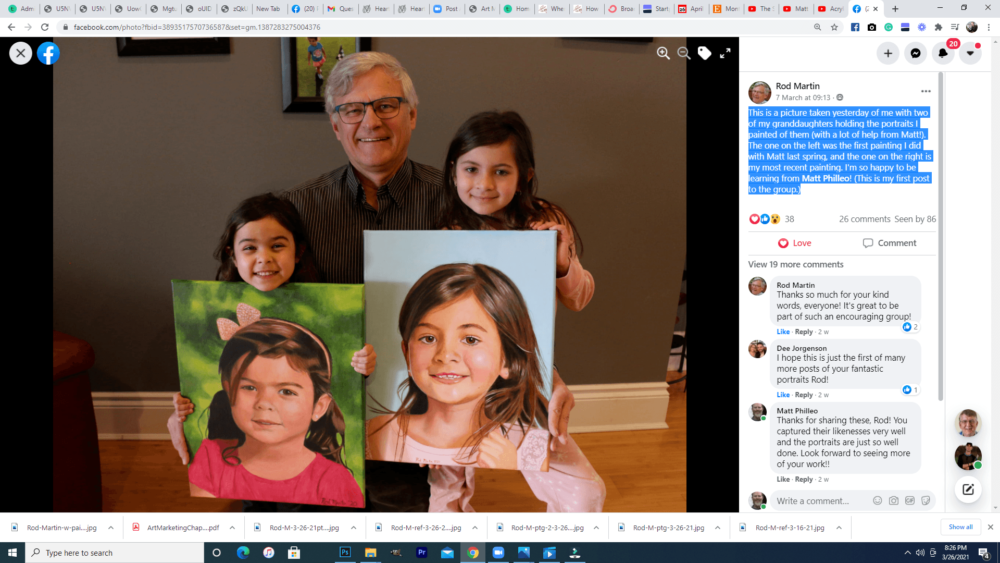
I am not going to boast in myself or my teaching. I do really care for my students, and then I put everything I have into helping them paint portraits they can be proud of. But the real secret is I pray and God helps me not only to teach, but my students to apply the teaching and create something amazing. They take the knowledge I give them, put into practice with tenacity, and they produce a fantastic portrait.
So, take the 2021 Spring Portrait Painting Challenge!
You can register below and get started. It is completely FREE to join the challenge and participate. When you join, I’ll send you the “Welcome Kit” which includes:
- The Supplies List (so you know what you need to paint with us, your shopping list. 🙂 )
- The Reference Photo with and without the grid, then with high resolution, that you can download ready to print out or display on your tablet. You’ll be able to create an accurate portrait this way.
- The Palette Layout Guide showing you how to arrange your colors so they don’t get muddy on your palette
- The Master Class Lesson Schedule
- the Lessons emailed to you
- A private Facebook group to cheer you and help answer your questions
- And a few “bonuses” like opportunities to win my paid online classes
REGISTER TODAY. The challenge is ongoing, something you can do at your own pace. It’s not too late to enter!
Register for the Challenge!- How to Paint Foliage Using the Acrylic Glazing Technique
- How to Trace for an Accurate Portrait Sketch
- How to Paint Realistic Eyes in Your Acrylic Portrait
- How to Add Raw Umber Dark & Ultramarine Blue to Your Portrait
- How to Make Your Own Raw Umber Dark
- How to Paint Realistic Trees & Grass in Your Acrylic
- How to Block In Skin Tone Values Using Glazing Technique
- How to Paint Vibrant Reds in Your Acrylic Portrait
- How to Glaze Background Colors & More Acrylic Portrait
- How to Paint White Clothing in Your Acrylic Portrait
- How to Easily Transition from a Sketch to a Painting
- How to Block In Shading & Skin Tones in Your Acrylic
- How to Build Up Color on Acrylic Pet Portrait
- How to Build Up Form on Clothing with Acrylic
- How to Paint Dark Clothing Using Acrylic Glazing Technique
- How to Paint a 24 x 30 Acrylic With 30 People
- How to Do Smooth Shading with Acrylic
- How to Sketch an Acrylic Portrait with a Grid
Read more about how to paint a portrait that you can surely be proud of!
Look forward to teaching you!
—Matt
Questions? Comments? Share your thoughts below. Please share this post with your friends!
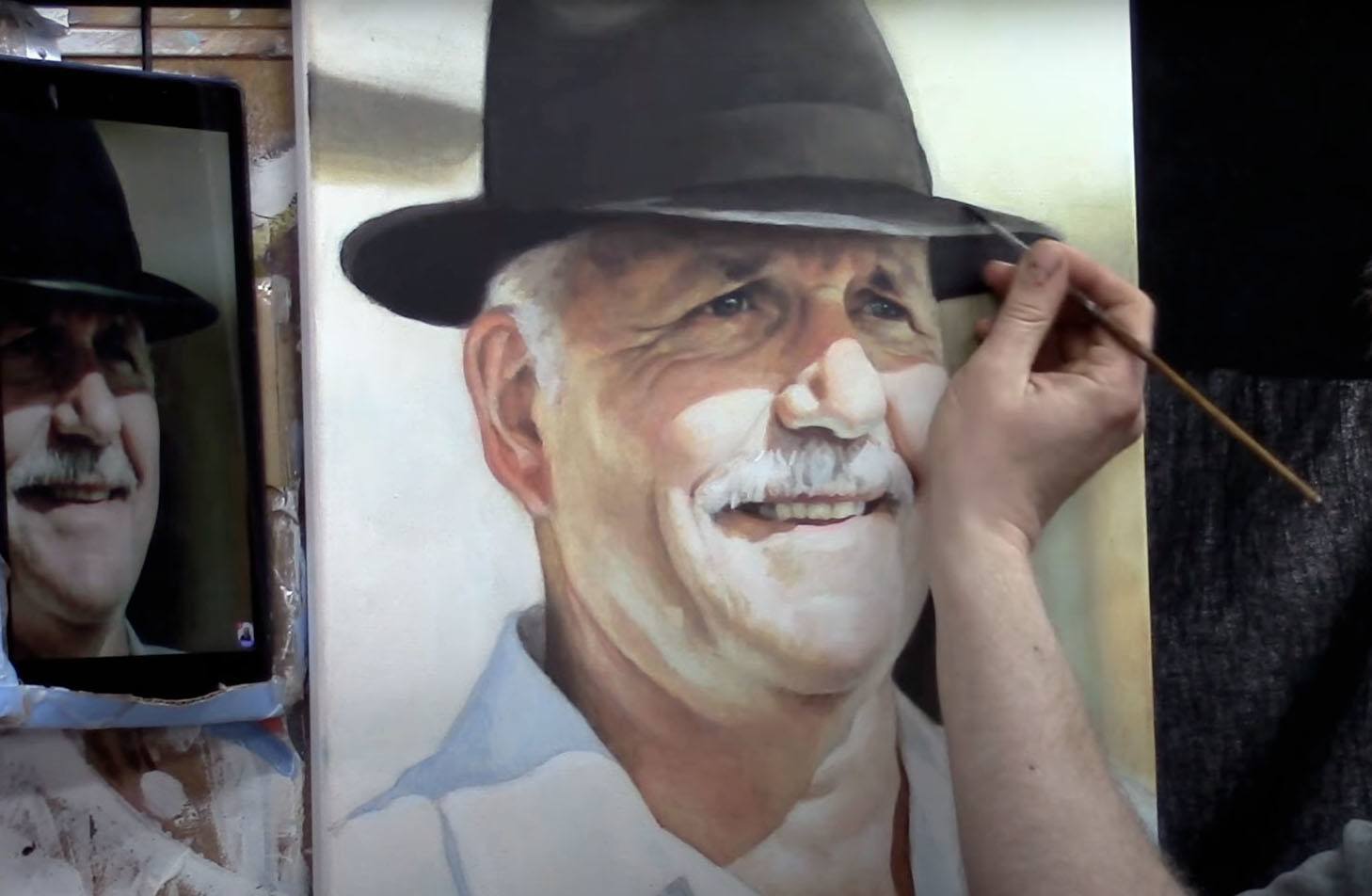
2021 Spring Acrylic Portrait Painting Challenge is Coming!
It was last year around this time that I got news of my state doing a lockdown because of the new coronavirus that was spreading like wildfire.
I thought, What would happen to my art business? I won’t be able to do art shows or teach classes anymore. If the economy tumbles, will I be able to pay the mortgage?
You probably had similar thoughts brewing in your mind too. You still remember what it felt like after the initial news of this unknown pandemic.
Many businesses were hunkering down, trying to stay afloat while the sea of uncertainty and fear poured in around them.
I didn’t know what to do either.
But one of my business mentors, Graham Cochrane, said “this is not a time to hold back. This is a time to be generous.”
I thought, “I could do a portrait challenge. Many artists are stuck at home, sheltering in place. It would not only give us all something productive to do, but would help conquer the fear that can come from just letting our thoughts run wild.”
Additionally, I could teach a whole class on how to paint this portrait, for free, showing all the steps from start to finish.
But then the other side of my mind protested, “If you do that, if you give it all away for free, who will ever buy your courses again?”
“No!” the right side of my brain said.“I’m going to trust God. I’ll be generous like Jesus is to me and just trust God will take care of me and my family!”
So I listened to that part of my brain (and God) and launched the Spring Portrait Acrylic Painting Challenge. We painted this portrait of “Lockdown Larry” the man with the hat, supplied by
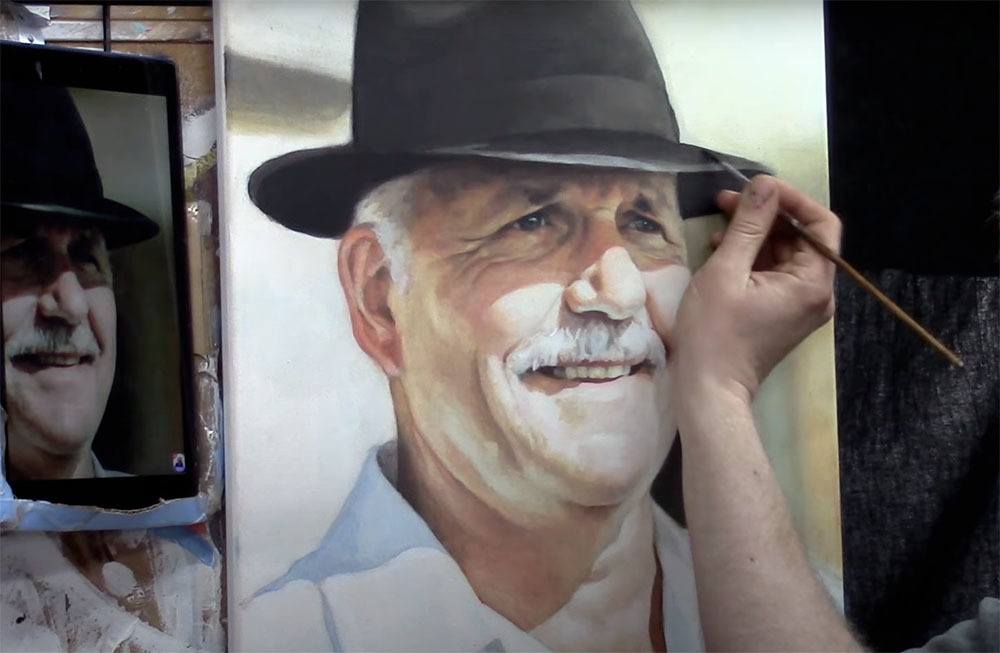
Matt Philleo painting an acrylic portrait from a photo for the Spring Portrait Painting Challenge, ©2020 by Matt Philleo
Over 700 artists took the challenge. Many never painted a portrait before, but through their hard work and perseverance, at the end of the challenge produced a portrait they could be proud of!
Some even said they were struggling with severe depression, and the challenge helped lift them out of it!
When the challenge was over, some of these artists went on to do commissioned portraits and are now thriving! Others are painting portraits of their grandchildren, loving every moment of creating a special gift they can give and capture memories.
What a joy to hear these stories and be a part of it!
And the teaching side of my art business has increased incredibly since the challenge last year. God has blessed me and my family. The best part is, I am part of a wonderful community of artists in the All-Access Membership. We have such a great time learning and encouraging each other to do our very best portrait work.![]()
Well, it’s almost spring here in Wisconsin and we are doing the challenge again. I will soon be putting out a call for images that we can vote on as a group to paint from.
I am excited and look forward to teaching you and helping you paint a portrait you can be proud of!
—Matt
YOUR NEXT STEP: Please share this Challenge posting with your friends, by using the social media links below. The more that see it, the more artists we can help all over the world. Thank you!
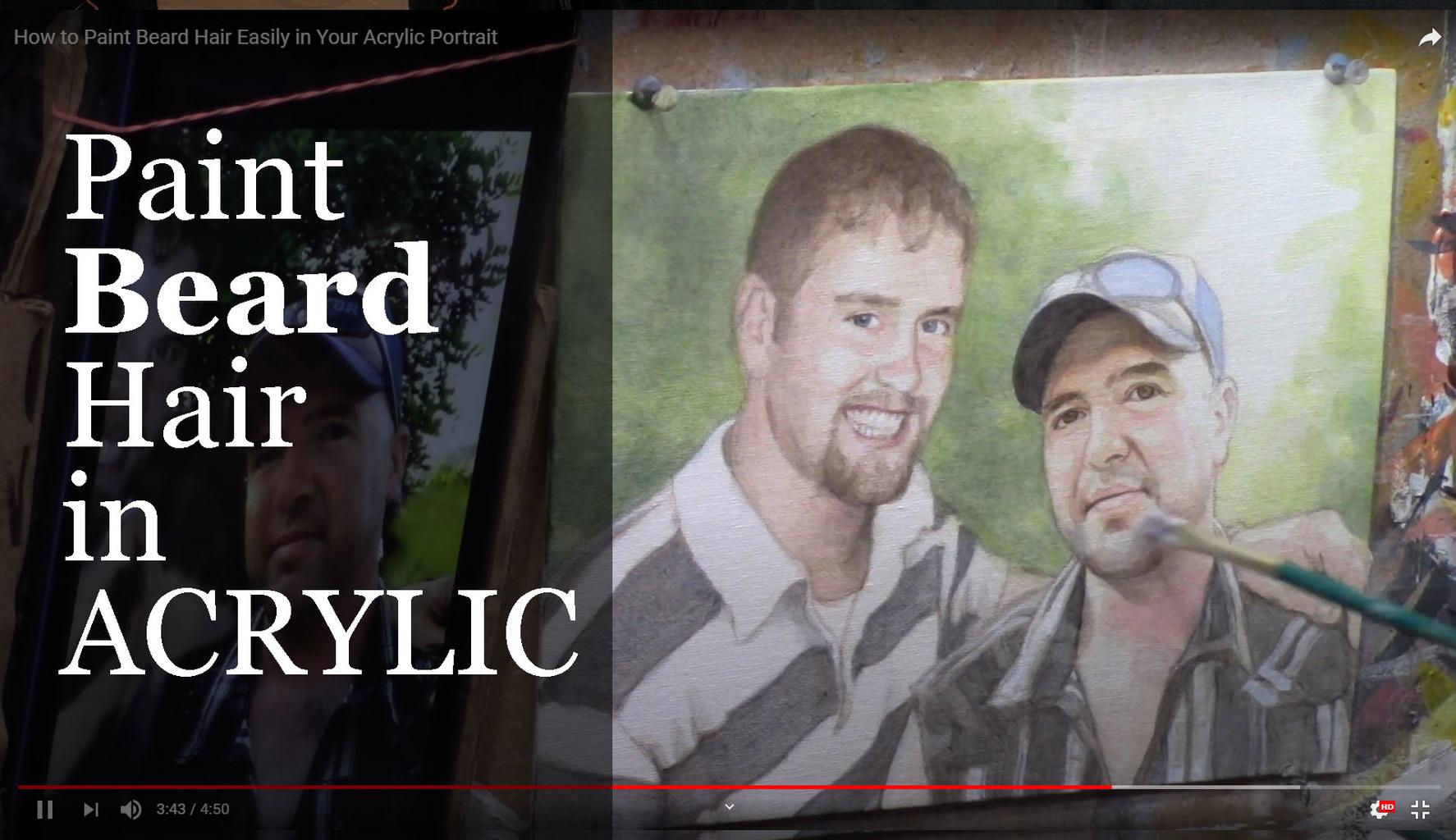
How to Paint Beard Hair Easily in Your Acrylic
Learn the art of painting beard hair with this simple and effective technique
Painting facial hair, such as beards, can be one of the more challenging details in portrait art. It may seem daunting to capture every individual hair in a realistic way, but it doesn’t have to be. In this guide, we’ll break down an easy method for painting beard hair using acrylics that doesn’t involve painstakingly painting each hair strand. Instead, we’ll focus on blocking in colors and values, giving the appearance of detail while keeping the process simple and effective.
Whether you’re a beginner or an experienced artist, this approach will help you add convincing realism to your acrylic portraits without frustration.
Step-by-Step Guide to Painting Beard Hair
1. Start with a Base Color
The key to painting facial hair, like a beard, is to begin with a base color that matches the underlying skin tones and beard shade. Then don’t worry about painting individual strands right away. Instead, follow this process:
- Mix raw umber as a base for the beard.
- Add a touch of alizarine crimson to introduce a slight warmth, and include titanium white to ensure the paint covers the surface effectively.
- For cooler tones in the beard, mix a bit of ultramarine blue into your base to add depth and shadow to your mix.
When you have your base color ready, load it onto a flat edge brush and block in the general area of the beard. This block of color will act as the foundation for the beard hair. Focus on the overall value instead of trying to capture individual strands. This method prevents the painting from looking too busy or artificial.
2. Block in the Values
Instead of painting each beard’s hair, think in terms of values. Then block in the light and shadow areas of the beard, which will provide the necessary contrast and depth.
- Use your cool-toned mixture to paint the stubble or full beard, applying the color in sections.
- Blend as you go to create a soft transition between the skin and the beard.
The key here is to focus on where the light hits the face and then how it interacts with the beard hair. The shadows and highlights will imply the presence of hair, of course, without needing to meticulously paint each one.
3. Create Realism with Minimal Detail
Once your base layers and value blocks are in place, you can add a few finishing touches to suggest individual hairs. Use a detail brush sparingly, picking out just a few strands of hair in key places. Because this technique gives the illusion of individual hairs without overwhelming the painting with too much detail.
In smaller portraits, like 8×10 canvases, it’s unnecessary to paint each hair meticulously. Because simplicity often works best in creating a realistic appearance. Focus on the main areas of light and shadow to convey the overall texture of the beard.
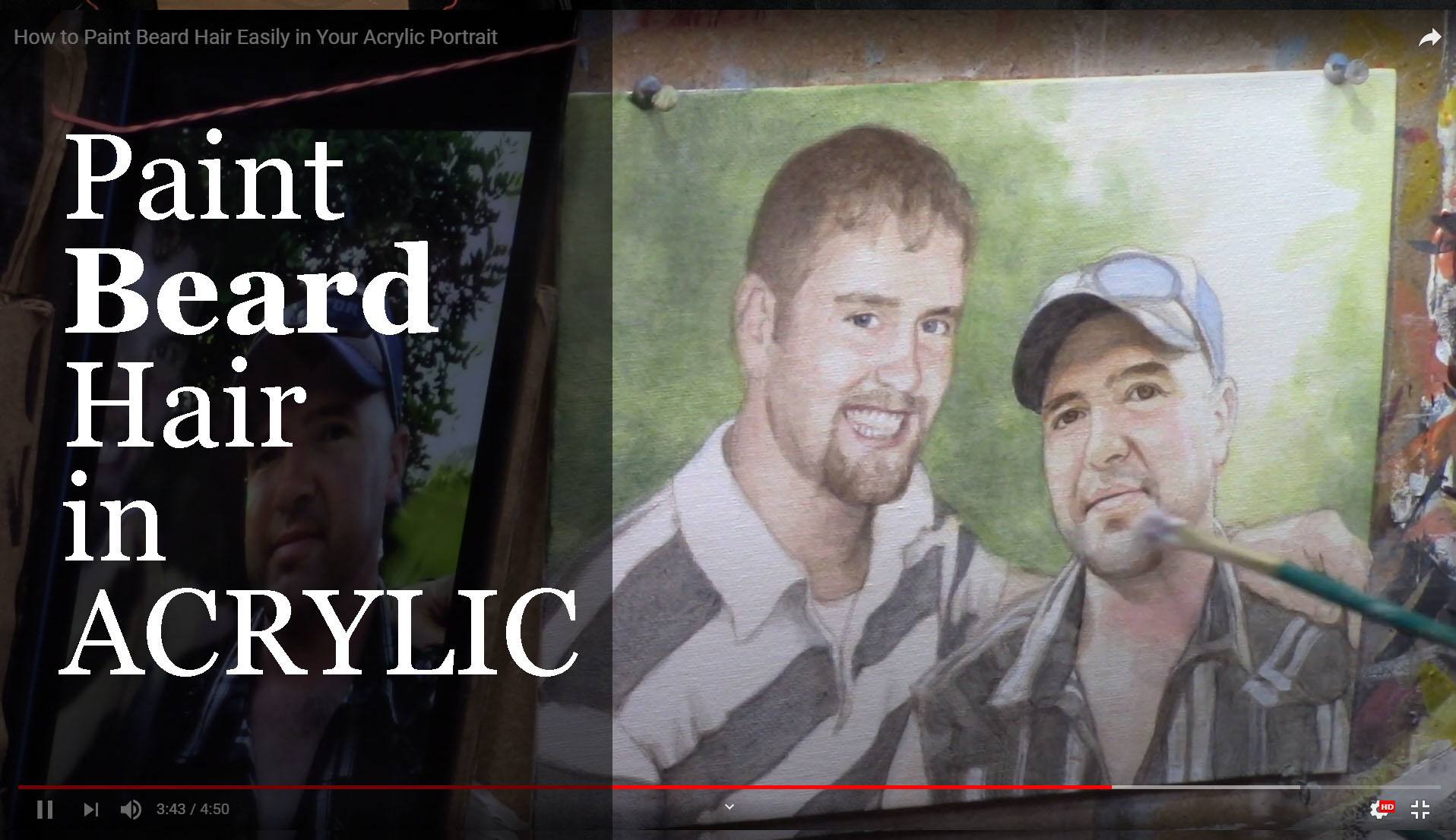
Techniques to Improve Beard Hair Painting
1. Use Color Blocks to Imply Detail
The most efficient way to paint beard hair in acrylic portraits is to rely on blocks of color rather than individual strokes. Because this method implies detail, which can trick the viewer’s eye into perceiving realism without overwhelming the painting with unnecessary detail.
2. Choose the Right Brush
For the base layer, use a flat edge brush to cover larger areas and then create smooth transitions between skin and hair. When adding a few fine hairs for detail, switch to a small, pointed detail brush for better control.
3. Blend Your Colors
Blending is crucial when painting facial hair. You don’t want the beard to look too stark or separated from the face. Softly blend the edges of the beard into the skin tone, paying attention to areas of transition where light hits the skin through the hair.
4. Focus on Contrast
Realism in facial hair is often achieved by strong contrasts between light and shadow. Beard hair, especially in portraits, reflects light differently than other parts of the face. Make sure to adjust your highlights and shadows accordingly.
- Use more titanium white to brighten up areas where the light hits the beard.
- Deepen the shadows with your ultramarine blue mix, especially near the edges of the jawline.
Tips for a Realistic Beard in Acrylics
- Work in Layers: Build the beard gradually, adding more color and depth in layers as you progress.
- Don’t Overwork It: Less is more when painting beard hair. Don’t feel the need to paint every strand. A few details go a long way.
- Play with Texture: Facial hair, especially beards, has texture. Try lightly dry brushing to simulate this texture without going into too much fine detail.
- Observe the Reference: Always refer back to your source image. Look at how the beard flows, where the shadows fall, and how the hair interacts with the face.
Common Mistakes to Avoid
- Overdetailing: Beginners often make the mistake of trying to paint every individual hair, which can result in a cluttered and unnatural look. Instead, focus on the big picture: light, shadow, and overall shape.
- Incorrect Brush Choice: Using a brush that’s too large or too small can cause issues. A flat edge brush is best for blocking in large areas, while a fine detail brush works for final touches.
- Too Many Highlights: Over-highlighting the beard can make it appear unrealistic. Use highlights sparingly to ensure they mimic how light naturally interacts with facial hair.
Conclusion
Learning how to paint beard hair in an acrylic portrait can elevate the realism in your work without requiring an excessive amount of time or detail. By focusing on values, layering colors, and adding minimal detail, you can create the illusion of beard hair that looks natural and lifelike.
Remember, painting doesn’t have to be complicated. Sometimes, simplicity achieves the best results. Experiment with this technique in your next portrait, and you’ll be amazed at how easily you can paint realistic beard hair.
If you’d like to learn more tips and techniques for improving your acrylic portrait skills, check out our full-length tutorials at realisticacrylic.com and download my free mini course, & guide here. Happy painting!
- How to Paint Foliage Using the Acrylic Glazing Technique
- How to Trace for an Accurate Portrait Sketch
- How to Paint Realistic Eyes in Your Acrylic Portrait
- How to Add Raw Umber Dark & Ultramarine Blue to Your Portrait
- How to Make Your Own Raw Umber Dark
- How to Paint Realistic Trees & Grass in Your Acrylic
- How to Block In Skin Tone Values Using Glazing Technique
- How to Paint Vibrant Reds in Your Acrylic Portrait
- How to Glaze Background Colors & More Acrylic Portrait
- How to Paint White Clothing in Your Acrylic Portrait
- How to Easily Transition from a Sketch to a Painting
- How to Block In Shading & Skin Tones in Your Acrylic
- How to Build Up Color on Acrylic Pet Portrait
- How to Build Up Form on Clothing with Acrylic
- How to Paint Dark Clothing Using Acrylic Glazing Technique
- How to Paint a 24 x 30 Acrylic With 30 People
- How to Do Smooth Shading with Acrylic
- How to Sketch an Acrylic Portrait with a Grid
Read more about how to paint a portrait that you can surely be proud of!
I’d love to hear your thoughts about this video. Please share it with your friends and family. Let me know if you have any further questions. I’ll greatly help you.
If you’d like to learn more, sign up for my free email tips and video class today.
Learn How to Paint Acrylic Portraits With My Free Mini-Video Course!
Thank you so much for taking the time to read this tutorial and watch the video. That means a lot to me. I hope you find it very helpful in your portrait painting.
Yours for Better Portraits,

P.S. Did you find this post helpful or encouraging? If so, send it on ahead! Let others know with the share buttons below. I’d love to hear your comments. Thank you so much! Also, do you have a question on acrylic portrait painting you’d like answered? Let me know, and I’d be happy to help!
elpful or encouraging, would you send it on ahead? Let others know with the share buttons below. I’d love to hear your comments. Thank you so much!
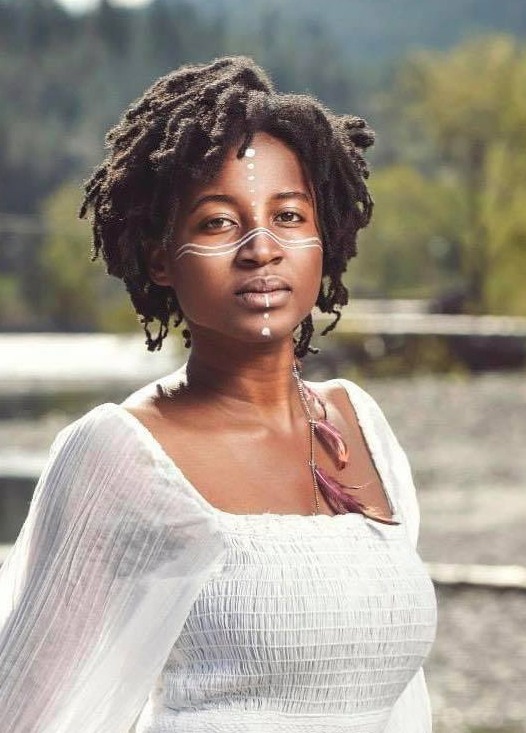
Take the Fall Acrylic Portrait Painting Challenge!
Have you ever wondered if you could paint a portrait?
You can.
Take the Fall Acrylic Portrait Painting Challenge.
Last Spring, over 700 artists took the challenge and many painted an amazing portrait, their very first time. This jump-started some of the artists into doing commissioned portraits or painting beautiful pictures of their children and grandchildren.
In the challenge, we’ll all paint the same image together and I’ll teach you how to do it, step-by-step with demonstration videos.

Reference image for the Fall Acrylic Portrait Painting Challenge. Photograph by Jonah Greenman, used with permission
The Acrylic Portrait Painting Challenge is free to join and participate.
Register below to get the Welcome Kit, which includes the Supplies List, the Full Resolution Reference Image with a Grid, Palette Layout Guide, and the Masterclass Video Lesson Schedule.
I look forward to seeing you paint a portrait you can be proud of!
And now, here are the Masterclass Lessons:
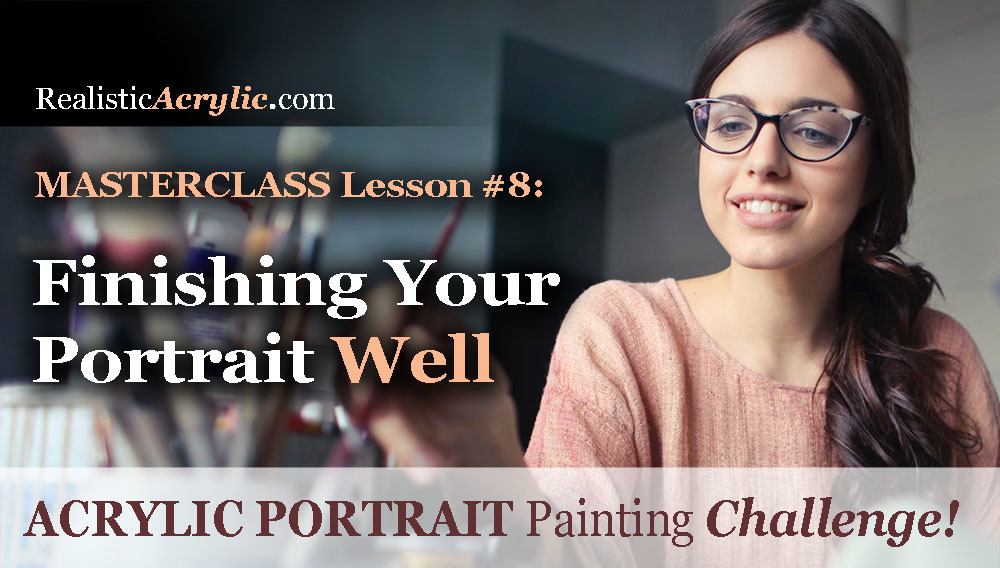
[PORTRAIT CHALLENGE] Masterclass Lesson #8: Finishing Your Portrait Well
The Acrylic Portrait Painting Challenge Masterclass, Lesson #8, is out!
This is our FINAL lesson together.
It’s kind of sad to see the challenge drawing to a close. As I write this, it’s been an entire month since I started this challenge on April 6, 2020.
My goal was to create a way for artists to overcome the challenges of being in COVID-19 lockdown, create something beautiful with their time, and grow their skills as artists.
Many, many have risen to the challenge and done exactly that. If you’re reading this, and you’ve taken the challenge; you’ve gone through steps 1-7, I’m so proud of you! It’s not easy to paint a realistic portrait in acrylic, let alone during a quarantine. But you did it! And you’ve encouraged many others along the way.
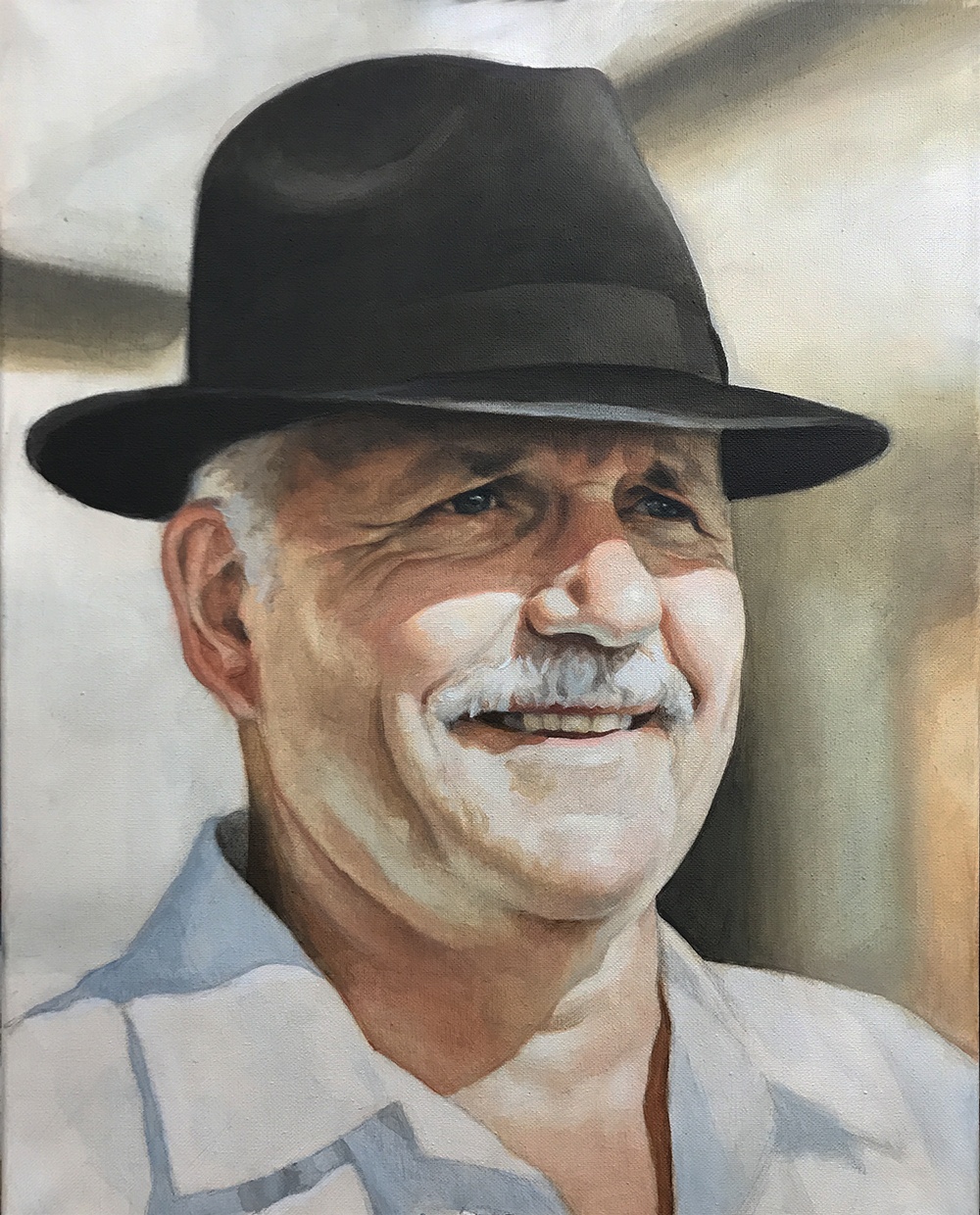
Acrylic Portrait Painting Challenge example portrait 16 x 20 acrylic on canvas, ©2020 by Matt Philleo
Because of that, you are a better artist, and have grown in character as a human being.
Your portrait —hopefully—is nearly done. What next? How do we “bring it home”, so to speak?
Let me show you, below!
Six Steps to Finishing Your Portrait Well
STEP ONE: Double-check the tonal values. Use my Value Checker tool for that.
STEP TWO: Double-check and add more detail to the eyes.
STEP THREE: Add vibrance to areas where certain shadows and highlights meet
STEP FOUR: Refine the shadows
STEP FIVE: Redefine the edges of your subject and objects
STEP SIX: Paint pin-point highlights on the face
When is the painting done?
Watch the video to find out…
[PORTRAIT CHALLENGE] Masterclass Lesson #8: Finishing Your Portrait Well
Is it too late to join the challenge? No, not at all. This challenge is meant to be ongoing—something you can do at your own pace. The lessons are free and they aren’t going anywhere.
If not, register below for FREE and I’ll send you:
- a downloadable/ printable”Welcome Kit” with a Supplies List and a Palette Color Layout Guide.
- high-resolution images of the photo we’ll be painting from for this challenge.
- each new lesson that comes out in this Masterclass series.
- a link to my private Facebook group, where you can do this challenge with other artists, get feedback and help on your portrait, and not feel alone.
REGISTER TODAY. It’s not too late to enter!
Where do we go from here?
I am so happy that you have done this challenge with me and hundreds of other artists. I give you a virtual high-five for the effort and dedication you have put in.
First, I give God the glory and thanks for entrusting all of us a talent to use. Next, I thank you and the other artists for taking your time and investing it into yourself as an artist and into others’ lives to encourage them.
You’ve left great comments for each other and your building skills to be able to paint a portrait you can take pleasure in and others can too.
This is what art is about. It transcends a piece of cotton canvas stretched on a wood frame, with plastic polymer resin on it. In the hands of a skilled painter, it becomes something beautiful that can last forever.
When we touch lives, bring hope and encouragement both in the creation and in the giving or selling of the art, we are doing something that has the potential to last for eternity!
So what we all have done in this group, by God’s grace, is amazing. And I believe it is just the start! 🙂
If you would like to work with me more closely, so I can personally help you become the portrait artist you’d like to be, be sure to watch my invitation at the end of the video. Whatever you decide, thank you so much for taking part in this challenge and may God richly bless your talent, and multiply it many times over!
Yours for Better Portraits,
![]()
If you found this post helpful or encouraging, would you send it on ahead? Let others know with the share buttons below. I’d love to hear your comments. Thank you so much!
Let me know if you have any questions about the challenge that I didn’t answer. Leave your question in the comments below and I’ll get back to you!
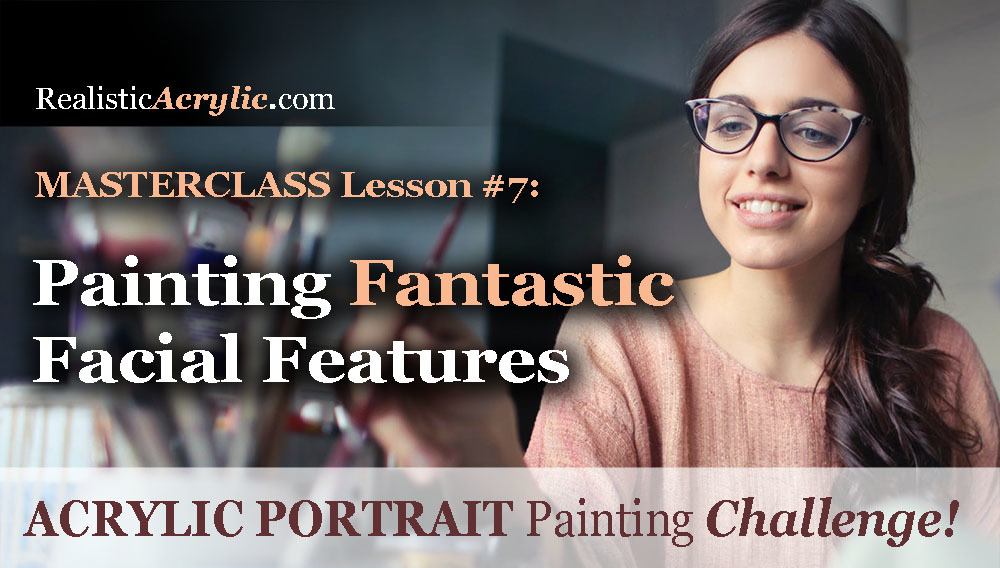
[PORTRAIT CHALLENGE] Masterclass Lesson #7: Painting Fantastic Facial Features
The Acrylic Portrait Painting Challenge Masterclass, Lesson #7, is out!
In our last lesson, I showed you how to visualize your painting as a map, and add shading and skin tones to specific spots on your portrait.
Now, in this lesson, I want to show you how to “dial-in” the facial features.
(To be upfront, I want you to know there is some video footage after Lesson 6 that I just couldn’t capture in this lesson, so it didn’t get too long for a YouTube video. All of the “in-between” BONUS videos will be posted within Realistic Acrylic All-Access Membership, after I’m finished posting these challenge lessons. The main Masterclass Lessons will be there as well as one complete course, and I will also segment them for easier viewing, since the learning interface makes that possible.)
For most of the students I serve, they do their portraits as gifts for loved ones, and on commission. So, unless you are painting only for an academic exercise, it’s important that you capture an accurate likeness of your subject.
I have painted many portraits over the years, and I can tell you from experience, it doesn’t matter how much detail I add to the painting, if the picture doesn’t look like Aunt Betty, it’s not going to sell. 🙂
So, as you are aiming for realism—that is, the accurate form, tonal values, skin tones, shading, detail, etc., you also want to work to achieve a true likeness.
Does it need to be perfect? No, just close. Usually 85-90% as accurate as the photo you’re working from (and even that is not as accurate as real life) and you’ll do well. But shoot for the 100% every time.
Let’s dive in…
Here’s what to do…
STEP ONE
- Redefine the eye-socket region.
- Redefine the eyelid folds.
- Dial-in the coloring of his eyes
STEP TWO
- Adjust the length and shape of nose (if needed) and add shading.
STEP THREE
- Add more depth to the eyes.
STEP FOUR
- Refine the mouth and mustache.
Ready to paint?
Now, before you begin…(Yes, still need to ask, because some folks are just discovering these Masterclass lessons 🙂 )
Are you registered for the challenge?
If not, register below for FREE and I’ll send you:
- a downloadable/ printable”Welcome Kit” with a Supplies List and a Palette Color Layout Guide.
- high-resolution images of the photo we’ll be painting from for this challenge.
- each new lesson that comes out in this Masterclass series.
- a link to my private Facebook group, where you can do this challenge with other artists, get feedback and help on your portrait, and not feel alone.
REGISTER TODAY. The challenge is ongoing, something you can do at your own pace. It’s not too late to enter!
Watch my in-depth Masterclass acrylic online tutorial below to see these steps in action.
After learning from this video, you’ll know exactly how to do it.
Make sure to watch the ENTIRE video first before diving into the painting. It will be worth it to do that. Then, I’d like you to go back and refer to whatever steps you need to as you paint. That way, you won’t miss any of the instruction and tips that will help you make this portrait your very best.
Here’s the video…
[PORTRAIT CHALLENGE] Masterclass Lesson #7: Painting Fantastic Facial Features
Moving Forward…
Thank you so much for all your effort you’ve put into doing this challenge with me and so many other artists. You’re almost there…your finished portrait is in sight.
Hey, if you’re having some challenges with your Portrait Challenge portrait, I just want to let you know, that’s natural! Painting portraits is difficult even for artists who have been doing it for years. But step-by-step instruction and encouragement from other students helps a lot. Many people in our group are doing with little to no experience, and they’re doing a knock-out job, even if they’re struggling in certain areas.
So, if you do feel stuck at this point, or find your results are less than what you expected, keep in mind this is a learning experience. You will get better as you practice painting portraits in the glazing technique, as so many others have.
That being said, if I can help in any way, please leave a comment or send me an email. I get a lot of requests, but I’ll do my very best to help. Also, make sure you join our amazing Facebook group, Realistic Acrylic Portraits, because you will receive helpful tips and encouragement from other students, some of whom are farther ahead in the portrait painting journey.
I’ll see you in our next class! What is it going to be? Painting the Final Details, Nuances, and Finishing Well. I’m excited to share that with you! Until then, be blessed in your painting and you and your family stay safe and healthy.
Yours for Better Portraits,
![]()
If you found this post helpful or encouraging, would you send it on ahead? Let others know with the share buttons below. I’d love to hear your comments. Thank you so much!
Let me know if you have any questions about the challenge that I didn’t answer. Leave your question in the comments below and I’ll get back to you!
